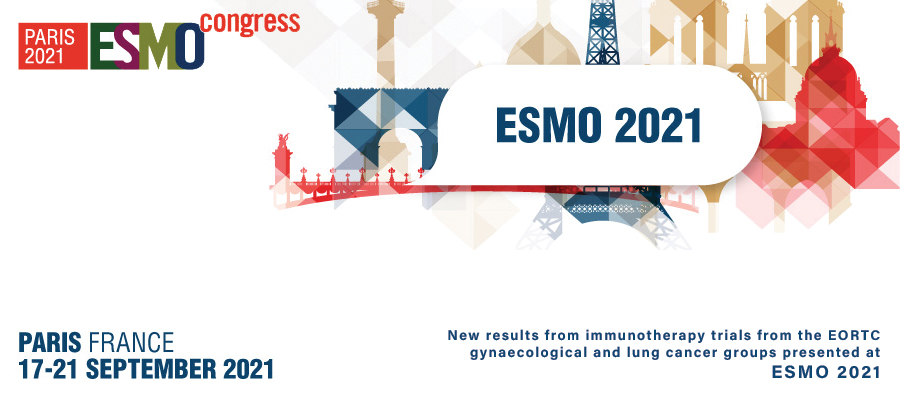New results from immunotherapy trials from the EORTC gynaecological and lung cancer groups presented at ESMO 2021
20 Sep 2021
Late-breaking results from two Phase 2 EORTC trials of immunotherapy were presented at the 2021 European Society of Medical Oncology (ESMO) congress on Friday 17 September. Immunotherapy drugs are relatively new additions to cancer treatment, and work by stimulating the immune system so that it can find and attack cancer cells. Over the past few decades, this has become an important part of treating some cancers and more new ways of utilising the immune system to this end are being discovered all the time.
Dr Susana Banerjee, a consultant medical oncologist from the Royal Marsden NHS Foundation Trust and Institute of Cancer Research, London, UK, presented results from the EORTC-15081 trial of different combinations of the immunotherapy drug atezolizumab with bevacizumab, targeted therapy against VEGF, and bevacizumab with acetylsalicylic acid or placebo in recurrent ovarian, fallopian tube or primary peritoneal adenocarcinomas that were resistant to platinum-based chemotherapy. Results to date of the use of immunotherapy alone in women with relapsed ovarian cancer have, overall, been rather disappointing, says Dr Banerjee. “Based on lab work, the EORTC Gynaecological Cancers group set out to investigate whether targeting the cells surrounding the tumour in addition to immune cells might improve outcomes for women with platinum-resistant ovarian cancer.”
The researchers recruited and randomised 122 patients from 12 sites in five countries to receive different combinations of the treatments being studied. They found that, while tumour response did not differ, the time to first subsequent therapy (TFST) was longer in those patients who had received bevacizumab plus atezolizumab therapy compared to bevacizumab alone, and that the addition of acetylsalicylic acid (aspirin) did not appear to improve the efficacy of treatment.
“Our results suggest that the chemotherapy-free combination of bevacizumab and atezolizumab could delay the time to the next cancer treatment. Additionally, there are few patients who have continued on this treatment for much longer than others without their cancer worsening, and it will be important for us to understand why this is,” says Dr Banerjee.
The researchers now intend to follow up their results by analysing patient samples to understand which patients may benefit most and to identify potential predictive markers.
In the second presentation, Dr Nicolas Girard, from the Institut Curie, Paris, France, described results from the EORTC-ETOP NIVOTHYM2 trial of nivolumab and ipilimumab in patients with thymic tumours who were no longer responding to chemotherapy. Thymic tumours are rare and difficult to treat. They form in the cells covering the thymus, a small organ of the upper chest, near to the heart, and which forms part of the lymphatic system. “Immunotherapy is a new option for the patients for whom there was no longer any available standard therapy with this tumour,” says Dr Girard.
The trial design includes two groups – one receiving nivolumab alone and the other nivolumab plus ipilimumab. In the nivolumab only group, 55 patients were enrolled in 15 centers across five countries. After a median follow-up of 13.3 months, results from this group showed that nivolumab had been discontinued in 45 cases, primarily due to progression of the disease.
“However, the safety profile of nivolumab was manageable, and disease control was achieved in 63% of these patients. We are now working to try to identify predictors for the efficacy of immunotherapy in the patients enrolled in the trial. We now know that nivolumab alone does not live up to our first, optimistic expectations, even though we have been able to show the efficacy of immunotherapy. Our aim now is to increase the duration of efficacy with the addition of ipilimumab, and we hope to be able to report first results by quarter 3 of 2023,” says Dr Girard.
1. LBA32 – Principal results of the EORTC-1508 trial: A phase II randomised, multicentre study of bevacizumab vs atezolizumab and bevacizumab with acetylsalicylic acid or placebo in recurrent platinum-resistant ovarian, fallopian tube or primary peritoneal adenocarcinoma
2. LBA66 – Efficacy and safety of nivolumab for patients with pre-treated type B3 thymoma and thymic carcinoma: Results from the EORTC-ETOP NIVOTHYM phase II trial
Related News
Meet the new EORTC Board
9 Jul 2024
We are pleased to announce the release of the EORTC 2023 Annual Report
17 Jun 2024
Dr Denis Lacombe, EORTC CEO, appointed stakeholder co-chair of ACT EU advisory group
24 May 2024
Clinical Trials Day 2024: a Q&A on pragmatic clinical trials
20 May 2024
EORTC/EMA workshop suggests an international way forward for treatment optimisation studies
8 May 2024
EORTC’s Participation at the ESTRO Congress 2024
29 Apr 2024
EORTC: Advancing research and treatment for rare cancers
29 Feb 2024
EORTC Fellowship Programme: celebrating more than 20 years of impactful collaboration
22 Feb 2024
Appointment of Malte Peters as EORTC Strategic Alliance Officer
9 Feb 2024
Unique series of workshops in partnership with the European Medicines Agency (EMA)
7 Feb 2024


